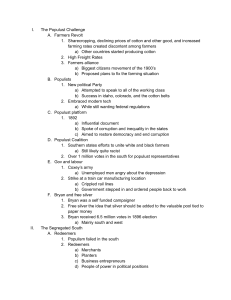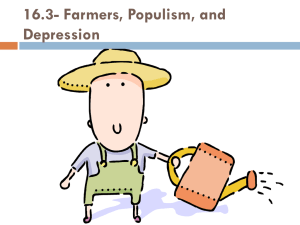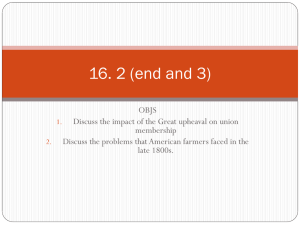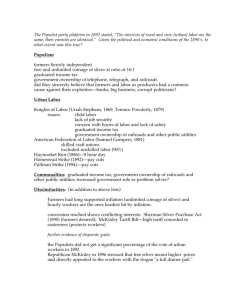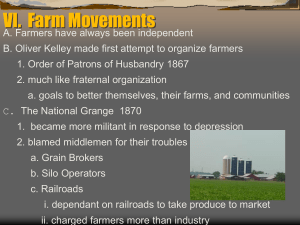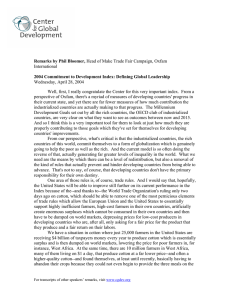APUSH Agriculture Time Line 5-4-10
advertisement
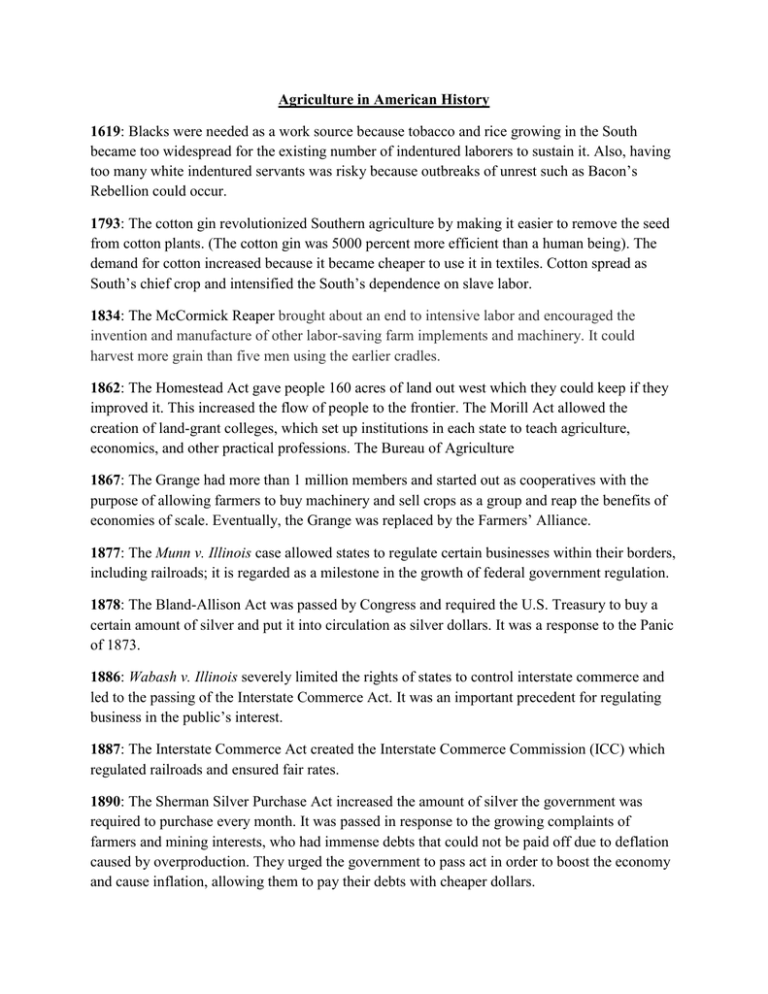
Agriculture in American History 1619: Blacks were needed as a work source because tobacco and rice growing in the South became too widespread for the existing number of indentured laborers to sustain it. Also, having too many white indentured servants was risky because outbreaks of unrest such as Bacon’s Rebellion could occur. 1793: The cotton gin revolutionized Southern agriculture by making it easier to remove the seed from cotton plants. (The cotton gin was 5000 percent more efficient than a human being). The demand for cotton increased because it became cheaper to use it in textiles. Cotton spread as South’s chief crop and intensified the South’s dependence on slave labor. 1834: The McCormick Reaper brought about an end to intensive labor and encouraged the invention and manufacture of other labor-saving farm implements and machinery. It could harvest more grain than five men using the earlier cradles. 1862: The Homestead Act gave people 160 acres of land out west which they could keep if they improved it. This increased the flow of people to the frontier. The Morill Act allowed the creation of land-grant colleges, which set up institutions in each state to teach agriculture, economics, and other practical professions. The Bureau of Agriculture 1867: The Grange had more than 1 million members and started out as cooperatives with the purpose of allowing farmers to buy machinery and sell crops as a group and reap the benefits of economies of scale. Eventually, the Grange was replaced by the Farmers’ Alliance. 1877: The Munn v. Illinois case allowed states to regulate certain businesses within their borders, including railroads; it is regarded as a milestone in the growth of federal government regulation. 1878: The Bland-Allison Act was passed by Congress and required the U.S. Treasury to buy a certain amount of silver and put it into circulation as silver dollars. It was a response to the Panic of 1873. 1886: Wabash v. Illinois severely limited the rights of states to control interstate commerce and led to the passing of the Interstate Commerce Act. It was an important precedent for regulating business in the public’s interest. 1887: The Interstate Commerce Act created the Interstate Commerce Commission (ICC) which regulated railroads and ensured fair rates. 1890: The Sherman Silver Purchase Act increased the amount of silver the government was required to purchase every month. It was passed in response to the growing complaints of farmers and mining interests, who had immense debts that could not be paid off due to deflation caused by overproduction. They urged the government to pass act in order to boost the economy and cause inflation, allowing them to pay their debts with cheaper dollars. 1892: The Populists organized from the Farmers’ Alliance and held a convention that created a platform calling for generous coinage of silver, government ownership of railroads and telegraphs, a graduated income tax, direct election of U.S. senators, and shorter workdays. WWI: World War I provided an economic boost for farmers because of the amount of food they had to produce for soldiers abroad. 1920s: The vast amounts of produce that the farmers were pumping out during WWI were not needed in the post-war era, which caused over production. Produce prices dropped over 50 percent and a prolonged drought in the Midwest turned the region into the Dust Bowl. 1933: The Agricultural Adjustment Act (AAA) provided payments to farmers in return for their agreement to cut production by up to one-half; the money to cover this program came from increased taxes. 1961: The Omnibus Farm Bill passed Agriculture in the South for much of American history had been focused on cash crops and the success of those cash crops. Farmers had a strong influence in the early politics of the country (Washington and Jefferson had plantations) but slowly lost their influence until the late 19th century when the Populist movement emerged and farmers started to organize to have their say in the government. The country has turned from an agrarian nation to far more of an industrial one; therefore, agriculture has had to have special regulations placed on it to help protect farmers such as the Sherman Silver Purchase Act and the AAA.
